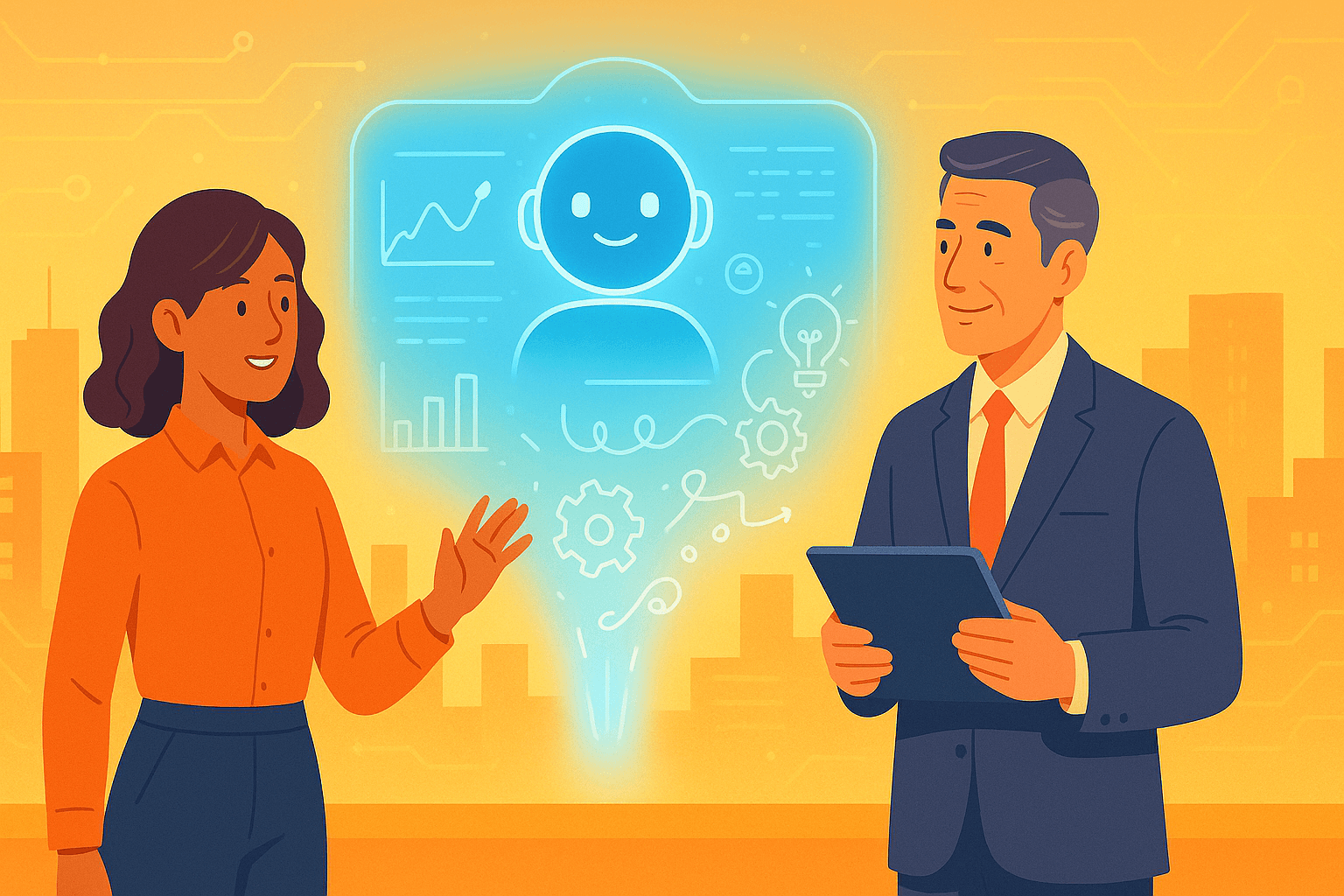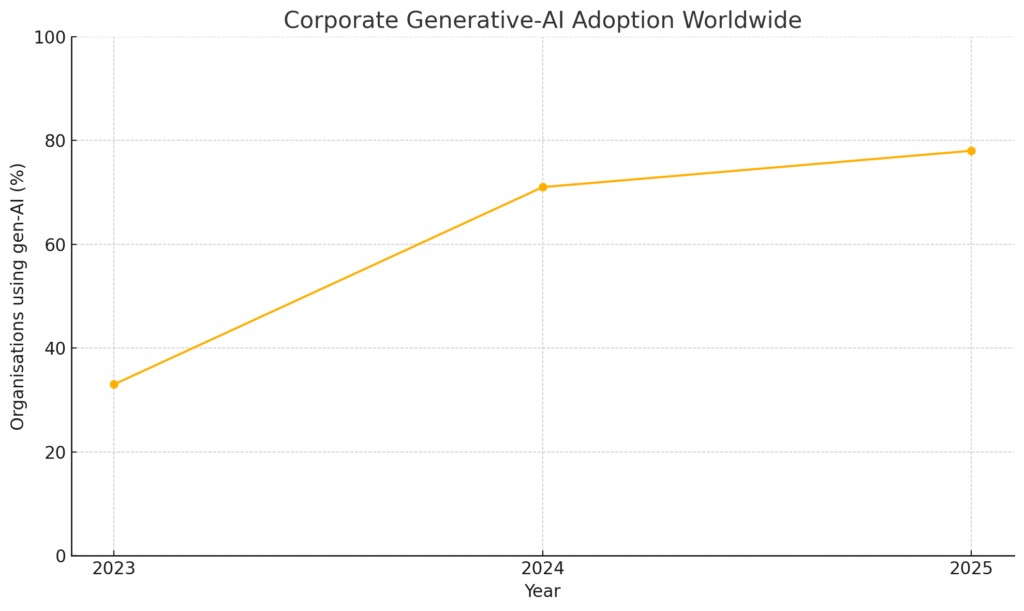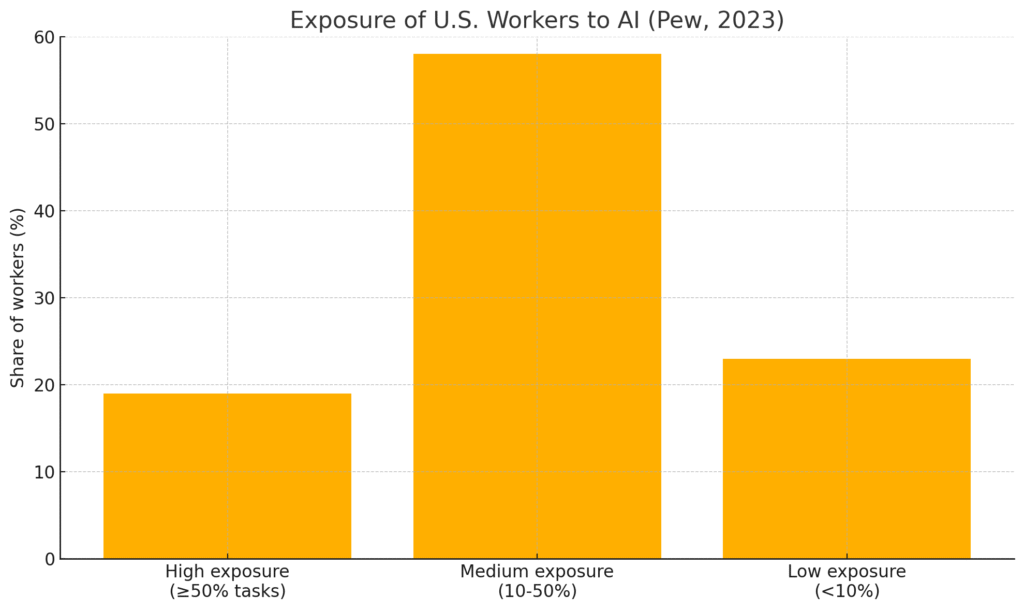
AI & Work in 2025: What’s Real, What’s Hype, and How to Stay Ahead
Is your career safe from AI? Will your degree still matter five years from now? Here’s what the latest research tells us, and what you can do about it.
Why Everyone’s Asking
2023 saw a surge in AI headlines from ChatGPT’s viral launch to CEOs promising robot-driven efficiency. By 2025, AI is no longer a side conversation. It’s at the center of how work is evolving.
But here’s the truth:
78% of companies now use AI in at least one business function.
Yet only 1% have seen consistent profits from those investments.
(Source: McKinsey, 2025)
So what does this mean for your job prospects? If you’re currently employed, or choosing a degree path, this post breaks down the facts.
AI Is Everywhere, But Not Always Effective
AI adoption is real. In just two years, the number of companies using AI has more than doubled.

According to McKinsey’s 2025 report:
- 78% of global companies report using AI.
- But only 24% have scaled AI beyond small pilots.
In short: most companies are experimenting, not replacing.
What Jobs Are at Risk? It Depends on the Task
Pew Research Center’s 2023 data reveals the level of AI exposure by job type:

- 19% of workers are in high-exposure roles (50%+ of tasks at risk).
- 58% are in medium-exposure roles.
- 23% are in low-exposure jobs, mostly manual labor and care work.
Key examples of high-risk roles:
- Data entry clerks
- Legal assistants
- Content writers
- Customer service reps
Low-risk roles involve:
- Physical dexterity (e.g., electricians, nurses)
- Emotional intelligence (e.g., therapists, educators)
- Unstructured problem-solving (e.g., field engineers)
Productivity Boost: Real for Some, Not All
AI is already amplifying productivity, especially for junior and mid-level professionals.
A 2023 study by MIT and Stanford found:
- Call center workers using AI responded 14% faster.
- Quality increased most among least experienced employees.
“AI won’t replace you, but a human using AI might.” – Erik Brynjolfsson, Stanford
The future is about “centaur careers” humans + AI working in tandem.
Big Picture: Net Job Loss or Gain?
It’s complicated.
According to the World Economic Forum’s Future of Jobs 2025 report:
- 92 million jobs will be displaced by 2030.
- 170 million new roles will be created.
- Net gain = +78 million jobs but with massive career reshuffling.
High churn is expected in:
- Admin roles
- Banking & finance
- Media & content
Growth is forecasted in:
- AI & machine learning
- Sustainability & green tech
- Education, health, and care sectors
What This Means for You
1. Your degree isn’t dead, but skills matter more.
Employers now prioritise adaptability, creativity, and communication just as much as technical knowledge.
2. Get fluent with AI, even if you’re not a coder.
Tools like ChatGPT, Claude, Notion AI, and Synthesia are used across marketing, R&D, and project management.
3. Start a personal “AI Audit.”
Ask yourself:
- Do I do repetitive tasks?
- Is most of my work written or rule-based?
- Could an AI model do 50% of what I do with training data?
If yes, time to upskill or pivot.
Looking Ahead
The International Monetary Fund warns that up to 40% of jobs globally will be affected by AI, and inequality may rise if support systems lag behind.
But here’s the good news:
AI doesn’t replace people. It replaces tasks.
People who learn how to use AI effectively are less replaceable than ever.
Coming Up Next in This Series
- Top 15 Most AI-Exposed Careers (and how to future-proof them)
- What Makes a Job “Replaceable”? 5 Red Flags to Watch
- Skills AI Can’t Replicate (Yet) – and How to Master Them
Further Reading
- Noy & Zhang, Science (2023) — Generative AI boosts productivity for customer support
- IMF (2024) — Generative AI and the Future of Work
- WEF (2025) — Future of Jobs Report
- McKinsey (2025) — State of AI in Business
Author Note
This blog is part of my “AI & Careers” series, helping professionals and students navigate the most important shift in work since the internet. Subscribe to get the next article direct to your inbox.
